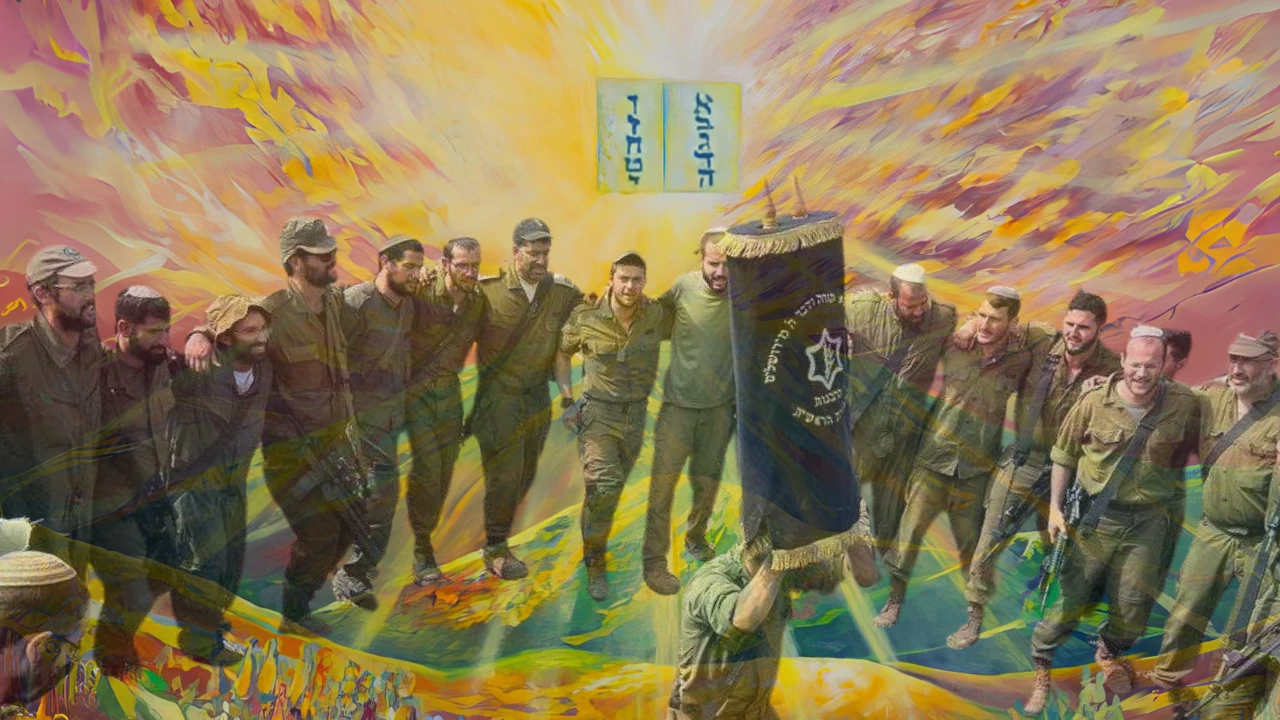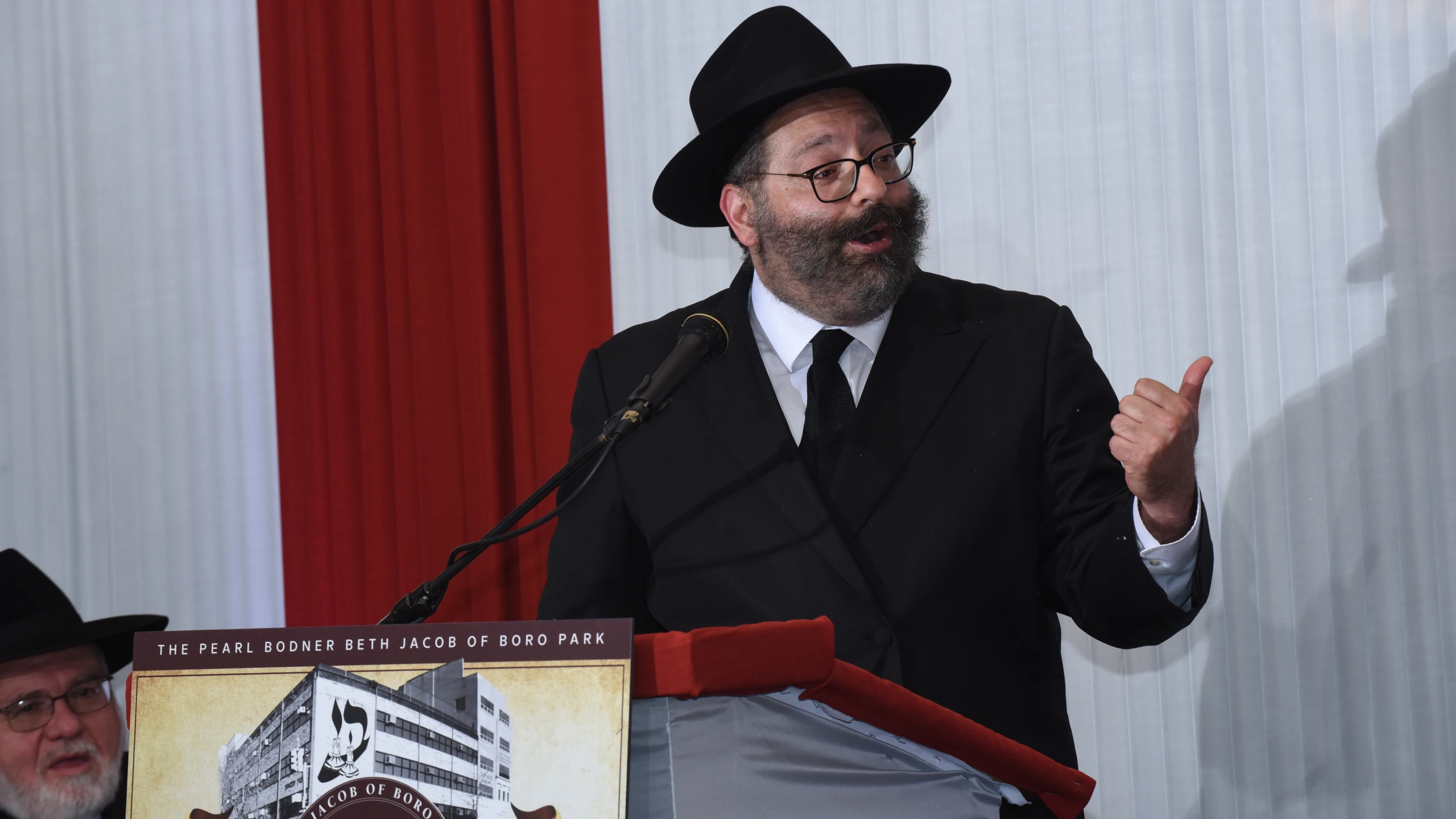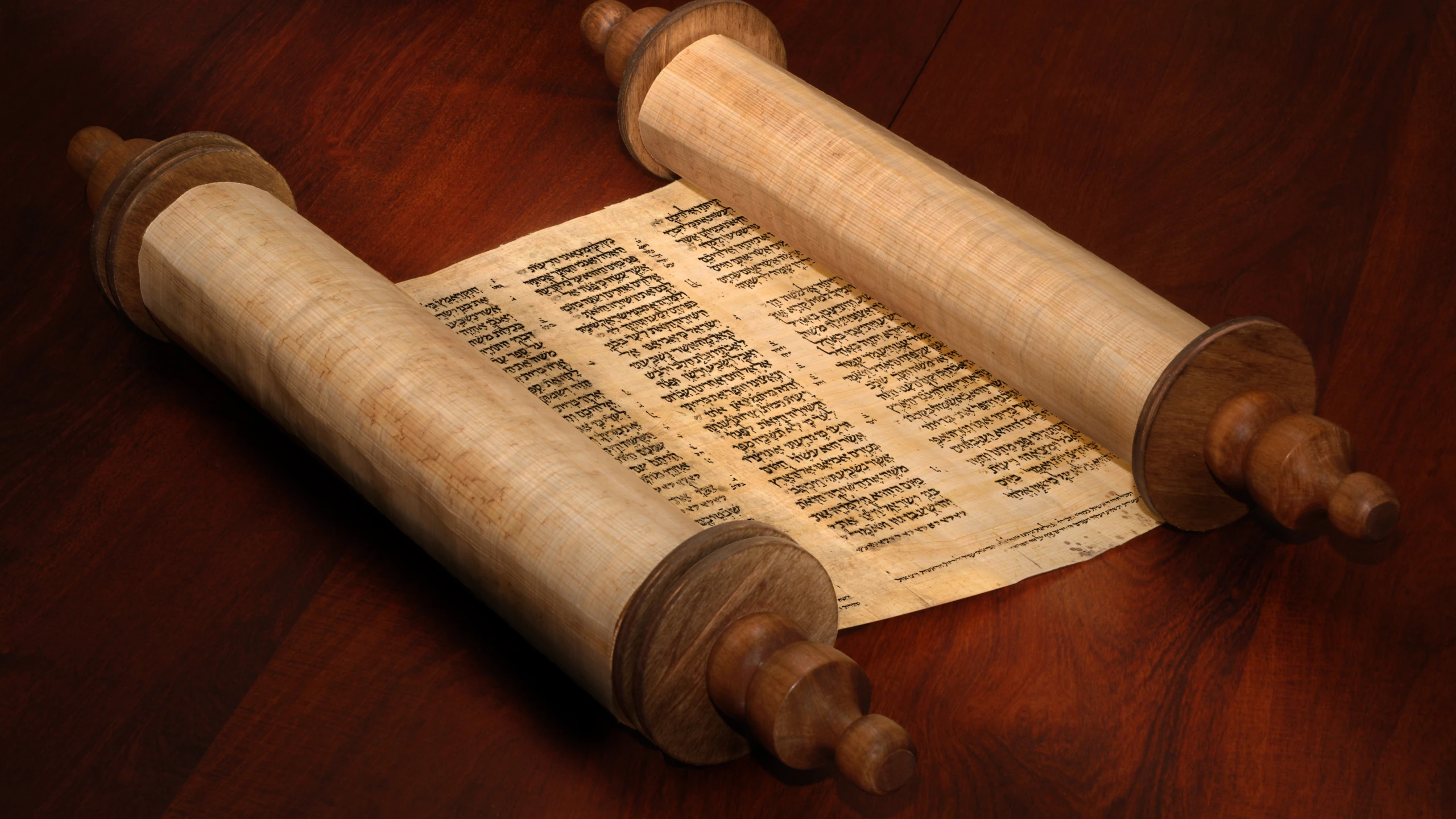Why I Am a Proud Jew
Three Truths which Compelled Jethro to Join Our People
- February 13, 2020
- |
- 18 Sh'vat 5780
Rabbi YY Jacobson
3147 views

Why I Am a Proud Jew
Three Truths which Compelled Jethro to Join Our People
Rabbi YY Jacobson
- February 13, 2020
The Story of Jethro
The opening of the weekly portion tells the story of the Pagan priest Jethro who chooses to come to the wilderness to spend time with the fledgling Jewish nation.
“Jethro, the priest of Midian, the father-in-law of Moses, heard of all that G-d did for Moses and His people Israel; that G-d had taken Israel out of Egypt.”[1] He took his daughter and two grandchildren and traveled to the wilderness to Moses and the new Jewish nation.
The Talmud asks this question: What did Jethro hear which inspired him to come to the Sinai desert?
The Talmud cites three opinions:[2]
זבחים קטז, א: מה שמועה שמע ובא? רבי יהושע אומר: מלחמת עמלק שמע ובא... רבי אלעזר המודעי אומר: מתן תורה שמע ובא. רבי אליעזר אומר: קריעת ים סוף שמע ובא.
Rabbi Joshua says, he heard of the war of Amalek against the Israelites and he came. Rabbi Elazar Hamudaei says, he heard of the giving of the Torah and he came. Rabbi Eliezer says: He heard about the splitting of the sea and he came. [3]
This seems strange. The Torah clearly states what Jethro heard: “And Jethro, the priest of Midian, the father-in-law of Moses, heard of all that G-d did for Moses and His people Israel; that G-d had taken Israel out of Egypt!” That is why he picked himself up and traveled to the Sinai desert. Why does the Talmud ask, “What did he hear that made him come?” And why does the Talmud offer different reasons than those stated in the biblical text?
Also, what is the logic behind these three Talmudic opinions? Must we always argue about everything? Why do these eminent Sages attribute Jethro’s sacrifice to another factor?
A Player, Not a Fan
The question that perturbed the Talmudic sages was this.
Prior to his arrival, Jethro was living in great honor and distinction. At the height of his career as the religious leader of Midian, Jethro was surrounded by riches and glory, as was the destiny of the Pagan priests of yore. Yet he left behind all of it, only to arrive in a barren wilderness, eager to hear the words of Torah. [4]He no longer saw himself as a Priest of Midian; instead, he identified himself as the father-in-law of Moses.[5]
Note the question of the Talmud: “mah shmuah shama uba?” what did Jethro hear which compelled him to COME? Why would a person of such stature abandon everything in order to pursue an attraction to Torah? What compels an aristocratic spiritual leader to abandon his comfortable habitat and glorious lifestyle and come join a nation of nomads in a desert? Yes, the Torah tells us that he heard what G-d did for Israel and that he took them out of Egypt. But Jethro could have been content with hearing the stories from far, watching them on CNN or Fox News, reading the blogs, and following the Jews on Facebook. What motivated him to say goodbye to his past and become one of three million Jews?
You can sit on your couch on Sunday and be a fan of one team or another; you can be an admirer, a cheerer, a supporter. But why did Jethro feel the need to undergo a metamorphosis from spectator to player? Why did he have to link his fate to the Jewish fate?
For this, the sages present three alternative answers. For one, Jethro witnessed the war of Amalek against the Israelites; for the other, Jethro heard of the Torah. For the third, he heard of the splitting of the sea. These three events capture the three timeless features which embody the Jewish story.
The Mystery of Hate
“Rabbi Joshua says, he heard of the war of Amalek against the Israelites and he came.”
The war of Amalek represented the timeless enigma of anti-Semitism. Here was Amalek, a strong and secure nation, unprovoked and unthreatened, yet this Amalekite nation found it necessary to declare war on a young nation that has just set itself free from decades of brutal persecution and suffering. The Jews have been in Pharaoh’s massive concentration camps for 86 years—beaten, crushed, and murdered mercilessly. Their infants were plunged into the Nile River, as the men were subjected to slave labor and torture. Now, these people were finally free. Merely a few weeks after their liberation, Amalek declared a sudden bloody war on Israel.
It was not a territorial dispute which ignited the conflict, as Amalek did not even make the claim that the “Jews were occupying his homeland.” The Jews were traveling in the wilderness, remote from Amalek’s territory. Nor were there any political, economic, or military motivations, as Israel was minding its own business and not intending even to visit Amalek’s country. Pharaoh at least had the excuse of fearing that the Jews would take over Egypt. What was Amalek’s excuse to come and kill Jews?
The answer is: He did not need an excuse. This was not rational, calculated hatred. He just hated them because of their very being.
When hate is rational, based on some fear that has some logic to it, even if it is unjustified, then it can be reasoned with and brought to an end. If I hate you because I feel that you undermine by business, or you don’t respect me in the company, the hatred has a cure. If I can see that you mean me no harm, or that you too have been operating out of fear, we can mend the relationship.
But how about unconditional, irrational hatred? What happens if I hate you because of your very existence? Such hate cannot be reasoned with. Amalek had no reason—not even an unjustified reason, based on unjust fear or insecurity—to attack Israel. This was irrational, groundless hate. As long as Jews existed, Amalek could not feel wholesome. With irrational hate, it is impossible to reason. It has no cause, no logic. Therefore it may never go away.
This is what Jethro observed. He realized that for some odd reason the Jew inspires irrational venom and animosity in the hearts of certain peoples. They hate the Jews simply because they are Jews. Something about the Jew drives them mad. And their hatred does not distinguish between Jewish adults or infants. Amalek, just like Haman and Hitler, sent two-month-old babies to the gas chambers with the same glee as he executed 50-year-old accomplished Jewish leaders. Jethro, an assiduous student of history, realized that there must be something incredibly holy, Divine, and good about the Jew which evokes such hatred toward him or her in the heart of every despot.[6] For Jethro, this was enough to know where to cast his lot.
Show me your enemies and I will tell you who you are. Draw up a list of Israel’s foes—from the days of yore to this very day—and you will see that they were and are all ruthless tyrants who would sell their own people for their greed and hunger for power. Stalin, Hitler, Saddam Hussein, Gamel Abdal Nasser, Yasser Arafat, Osama Bin Laden, Hafez Al Asad, Hassan Nasrallah, and Qassem Soleimani were not—and are not—only enemies of Israel and the Jews. They constitute and remain a threat to every good and decent person the world over. Seeing who hates Jews can be a powerful, if a bit strange, source of Jewish pride.
The Grandeur of Torah
“Rabbi Elazar Hamudaei says, he heard of the giving of the Torah and he came.”
Rabbi Elazar Hamudei’s point of view is that though anti-Semitism can teach us about the moral stature of the Jewish people, this was not enough. What enthralled Jethro about the Jewish story was not just that some people hated Jews with an irrational passion, but that G-d loved them, and He gave them His Torah. When Jethro heard of the powerful institutions of Judaism—its obsession with education, charity, justice, compassion, loving the stranger, respecting the slave, feeding the poor, honoring the old, giving dignity to the sick and the mentally challenged; when Jethro learned of the Mitzvos of Torah—Shabbos, Mikvah, Kashrus, Tefilin, prayer, study; when he discovered the ethical foundations of Judaism—that no one is above the law, that each person was created in G-d’s image and has infinite dignity, that history has a purpose, and that each of us was conceived in love to fulfill a mission—when the Midianite chief Pagan priest learned of all this, he fell in love with Torah and joined the People of the Book.
Now, 3300 years later, we often take for granted the contribution of the Torah to civilization. But Jethro did not. He understood what the Irish Tomas Cahill would articulate in his book “The Gifts of the Jews:”
“We can hardly get up in the morning or cross the street without being Jewish … The religion of the Hebrews—a tiny, marginal desert tribe—changed the worldview of Western civilization … The West's most deeply held beliefs about life, human nature, God, and justice are all owed to the ancient Israelites.
“In the ancient world of the ‘ever-turning Wheel,’ the countless gods and goddesses of the old mythologies played out their dramas in the world above. These gods were lustful, jealous, and greedy, and humans were of little import. Man had no freedom to choose a destiny, and no divinely inspired laws and ethics to guide him.” According to Cahill, the Hebrews "developed a whole new way of experiencing reality… It may be said with some justice that theirs is the only new idea that human beings have ever had."
Many Jews I know would be uncomfortable with these words written by an Irish gentile. We take for granted the quality of life shaped by Torah values and rituals over millennia. Shabbos creates happier homes; Mikvah inspires more stable and meaningful marriages; Torah education creates more balanced teenagers, less drugs, and fewer suicides. The emphasis on tradition and history diminishes the generational gap between parents and children. The laws of Jewish burial, sitting shivah, and saying kaddish are deeply comforting during times of loss. The sense of community helps people in times of crisis. All of these concepts were new and novel ideas and Jethro, a brilliant man of ideas, understood the majestic grandeur of Torah. This is what inspired him to link his destiny to the Nation of Torah.
The Super-Natural Quality
“Rabbi Eliezer says: He heard about the splitting of the sea and he came.”
Rabbi Eliezer takes it a step further. If it was only for Torah itself, Jethro could have remained on his hammock in Midian, sipping a pinna-colada and watching a Torah webcast on TheYeshiva.net, or reading a good Jewish book. What inspired him to leave his natural environment to join a crowded wilderness with millions of Hebrews? When he heard of the splitting of the sea.
The splitting of the sea demonstrated to Jethro another component of the Jewish story: The people of Israel transcended the laws of nature and the deterministic patterns of history. The largest seas, mightiest oceans, and fiercest tsunamis would not drown them. They would confront many overwhelming seas throughout their history, they would encounter impossible odds, and yet they would cross every sea and come out on the other side, stronger, more vibrant, more alive, and determined. A nation that endured crusades, inquisitions, pogroms, massacres, gas chambers, crematoriums, and suicide bombings—and yet inexplicably emerged, pulsating with a love for life and a zest for peace, this is a people whose narrative transcends the formulas of natural history.
Jethro understood what the great Russian novelist, Leo Tolstoy, articulated in a 1908 article: "The Jew is that sacred being who has brought down from heaven the everlasting fire, and has illuminated with it the entire world. He is the religious source, spring, and fountain out of which all the rest of the peoples have drawn their beliefs and their religions. The Jew is the emblem of eternity. He, who neither slaughter nor torture of thousands of years could destroy, he who neither fire, nor sword, nor Inquisition was able to wipe off the face of the earth. He, who was the first to produce the Oracles of God. He, who has been for so long the Guardian of Prophecy and has transmitted it to the rest of the world. Such a nation cannot be destroyed. The Jew is as everlasting as Eternity itself." [7]
Jethro understood that to experience this immortality he must leave his mansion in Midian and join the nomads in the desert. To become part of a story that transcends nature, you must transcend your own nature and actively join the symphony of eternity.
Jethro was not Jewish. Yet he made an awesome sacrifice in order to join the Jewish people and internalize Torah. We were given this gift by birth. Will we not leave our comfort zones to embrace it, celebrate it, study it, and make it part of our lives?
_______________
[1] Exodus 18:1.
[2] Zevachim 116a
[3] Rashi (Rabbi Shlomo Yitzchaki, 1040-1105, foremost commentator on the Torah) asks the same questions and answers: Of the splitting of the Red Sea and the war against Amalek. Interestingly, he combines two of the three answers in the Talmud.
[4]Rashi questions why the Torah finds it necessary to specify the obvious fact that Jethro came to Jews who were in the wilderness? We already know where they were! Citing the Midrash Mechilta, Rashi explains that the location is emphasized in order to praise Jethro. Prior to his arrival, Jethro was living in a place of great honor and distinction, and yet his heart moved him to go out to the wilderness, to a place of desolation, to hear the words of Torah.
[5] See Rashi to Exodus 18:1.
[6] At a public address on Purim 5725 (1965) the Lubavitcher Rebbe brilliantly explains the parable in Talmud Megillah 14b about the owner of the mound and the owner of the pit to capture the truth and enigma of anti-Semitism.
[7] Quoted in J.H. Hertz, A Book of Jewish Thoughts, Oxford University Press, London, 1926, p. 135.
- Comment
Class Summary:
What compels an aristocratic and successful Pagan priest, Jethro, to abandon his comfortable home and come join a nation of nomads in a desert? The Talmud cites three opinions. He heard about the war of Amalek; he heard about the Torah; or he heard about the splitting of the sea. What is the logic behind this argument?
These three events embody the three timeless features which capture the Jewish story: 1. Anti-Semitism. Wherever there have been Jews, they have automatically given birth to Jew haters. 2. The Torah and its impact on the world. 3. The stubborn nature of the Jew never to conform to the dictates of natural history. Each of these remarkable narratives touched Jethro at his core.
Dedicated by Yael Rothschild in memory of Yisasschar ben Yosef
The Story of Jethro
The opening of the weekly portion tells the story of the Pagan priest Jethro who chooses to come to the wilderness to spend time with the fledgling Jewish nation.
“Jethro, the priest of Midian, the father-in-law of Moses, heard of all that G-d did for Moses and His people Israel; that G-d had taken Israel out of Egypt.”[1] He took his daughter and two grandchildren and traveled to the wilderness to Moses and the new Jewish nation.
The Talmud asks this question: What did Jethro hear which inspired him to come to the Sinai desert?
The Talmud cites three opinions:[2]
זבחים קטז, א: מה שמועה שמע ובא? רבי יהושע אומר: מלחמת עמלק שמע ובא... רבי אלעזר המודעי אומר: מתן תורה שמע ובא. רבי אליעזר אומר: קריעת ים סוף שמע ובא.
Rabbi Joshua says, he heard of the war of Amalek against the Israelites and he came. Rabbi Elazar Hamudaei says, he heard of the giving of the Torah and he came. Rabbi Eliezer says: He heard about the splitting of the sea and he came. [3]
This seems strange. The Torah clearly states what Jethro heard: “And Jethro, the priest of Midian, the father-in-law of Moses, heard of all that G-d did for Moses and His people Israel; that G-d had taken Israel out of Egypt!” That is why he picked himself up and traveled to the Sinai desert. Why does the Talmud ask, “What did he hear that made him come?” And why does the Talmud offer different reasons than those stated in the biblical text?
Also, what is the logic behind these three Talmudic opinions? Must we always argue about everything? Why do these eminent Sages attribute Jethro’s sacrifice to another factor?
A Player, Not a Fan
The question that perturbed the Talmudic sages was this.
Prior to his arrival, Jethro was living in great honor and distinction. At the height of his career as the religious leader of Midian, Jethro was surrounded by riches and glory, as was the destiny of the Pagan priests of yore. Yet he left behind all of it, only to arrive in a barren wilderness, eager to hear the words of Torah. [4]He no longer saw himself as a Priest of Midian; instead, he identified himself as the father-in-law of Moses.[5]
Note the question of the Talmud: “mah shmuah shama uba?” what did Jethro hear which compelled him to COME? Why would a person of such stature abandon everything in order to pursue an attraction to Torah? What compels an aristocratic spiritual leader to abandon his comfortable habitat and glorious lifestyle and come join a nation of nomads in a desert? Yes, the Torah tells us that he heard what G-d did for Israel and that he took them out of Egypt. But Jethro could have been content with hearing the stories from far, watching them on CNN or Fox News, reading the blogs, and following the Jews on Facebook. What motivated him to say goodbye to his past and become one of three million Jews?
You can sit on your couch on Sunday and be a fan of one team or another; you can be an admirer, a cheerer, a supporter. But why did Jethro feel the need to undergo a metamorphosis from spectator to player? Why did he have to link his fate to the Jewish fate?
For this, the sages present three alternative answers. For one, Jethro witnessed the war of Amalek against the Israelites; for the other, Jethro heard of the Torah. For the third, he heard of the splitting of the sea. These three events capture the three timeless features which embody the Jewish story.
The Mystery of Hate
“Rabbi Joshua says, he heard of the war of Amalek against the Israelites and he came.”
The war of Amalek represented the timeless enigma of anti-Semitism. Here was Amalek, a strong and secure nation, unprovoked and unthreatened, yet this Amalekite nation found it necessary to declare war on a young nation that has just set itself free from decades of brutal persecution and suffering. The Jews have been in Pharaoh’s massive concentration camps for 86 years—beaten, crushed, and murdered mercilessly. Their infants were plunged into the Nile River, as the men were subjected to slave labor and torture. Now, these people were finally free. Merely a few weeks after their liberation, Amalek declared a sudden bloody war on Israel.
It was not a territorial dispute which ignited the conflict, as Amalek did not even make the claim that the “Jews were occupying his homeland.” The Jews were traveling in the wilderness, remote from Amalek’s territory. Nor were there any political, economic, or military motivations, as Israel was minding its own business and not intending even to visit Amalek’s country. Pharaoh at least had the excuse of fearing that the Jews would take over Egypt. What was Amalek’s excuse to come and kill Jews?
The answer is: He did not need an excuse. This was not rational, calculated hatred. He just hated them because of their very being.
When hate is rational, based on some fear that has some logic to it, even if it is unjustified, then it can be reasoned with and brought to an end. If I hate you because I feel that you undermine by business, or you don’t respect me in the company, the hatred has a cure. If I can see that you mean me no harm, or that you too have been operating out of fear, we can mend the relationship.
But how about unconditional, irrational hatred? What happens if I hate you because of your very existence? Such hate cannot be reasoned with. Amalek had no reason—not even an unjustified reason, based on unjust fear or insecurity—to attack Israel. This was irrational, groundless hate. As long as Jews existed, Amalek could not feel wholesome. With irrational hate, it is impossible to reason. It has no cause, no logic. Therefore it may never go away.
This is what Jethro observed. He realized that for some odd reason the Jew inspires irrational venom and animosity in the hearts of certain peoples. They hate the Jews simply because they are Jews. Something about the Jew drives them mad. And their hatred does not distinguish between Jewish adults or infants. Amalek, just like Haman and Hitler, sent two-month-old babies to the gas chambers with the same glee as he executed 50-year-old accomplished Jewish leaders. Jethro, an assiduous student of history, realized that there must be something incredibly holy, Divine, and good about the Jew which evokes such hatred toward him or her in the heart of every despot.[6] For Jethro, this was enough to know where to cast his lot.
Show me your enemies and I will tell you who you are. Draw up a list of Israel’s foes—from the days of yore to this very day—and you will see that they were and are all ruthless tyrants who would sell their own people for their greed and hunger for power. Stalin, Hitler, Saddam Hussein, Gamel Abdal Nasser, Yasser Arafat, Osama Bin Laden, Hafez Al Asad, Hassan Nasrallah, and Qassem Soleimani were not—and are not—only enemies of Israel and the Jews. They constitute and remain a threat to every good and decent person the world over. Seeing who hates Jews can be a powerful, if a bit strange, source of Jewish pride.
The Grandeur of Torah
“Rabbi Elazar Hamudaei says, he heard of the giving of the Torah and he came.”
Rabbi Elazar Hamudei’s point of view is that though anti-Semitism can teach us about the moral stature of the Jewish people, this was not enough. What enthralled Jethro about the Jewish story was not just that some people hated Jews with an irrational passion, but that G-d loved them, and He gave them His Torah. When Jethro heard of the powerful institutions of Judaism—its obsession with education, charity, justice, compassion, loving the stranger, respecting the slave, feeding the poor, honoring the old, giving dignity to the sick and the mentally challenged; when Jethro learned of the Mitzvos of Torah—Shabbos, Mikvah, Kashrus, Tefilin, prayer, study; when he discovered the ethical foundations of Judaism—that no one is above the law, that each person was created in G-d’s image and has infinite dignity, that history has a purpose, and that each of us was conceived in love to fulfill a mission—when the Midianite chief Pagan priest learned of all this, he fell in love with Torah and joined the People of the Book.
Now, 3300 years later, we often take for granted the contribution of the Torah to civilization. But Jethro did not. He understood what the Irish Tomas Cahill would articulate in his book “The Gifts of the Jews:”
“We can hardly get up in the morning or cross the street without being Jewish … The religion of the Hebrews—a tiny, marginal desert tribe—changed the worldview of Western civilization … The West's most deeply held beliefs about life, human nature, God, and justice are all owed to the ancient Israelites.
“In the ancient world of the ‘ever-turning Wheel,’ the countless gods and goddesses of the old mythologies played out their dramas in the world above. These gods were lustful, jealous, and greedy, and humans were of little import. Man had no freedom to choose a destiny, and no divinely inspired laws and ethics to guide him.” According to Cahill, the Hebrews "developed a whole new way of experiencing reality… It may be said with some justice that theirs is the only new idea that human beings have ever had."
Many Jews I know would be uncomfortable with these words written by an Irish gentile. We take for granted the quality of life shaped by Torah values and rituals over millennia. Shabbos creates happier homes; Mikvah inspires more stable and meaningful marriages; Torah education creates more balanced teenagers, less drugs, and fewer suicides. The emphasis on tradition and history diminishes the generational gap between parents and children. The laws of Jewish burial, sitting shivah, and saying kaddish are deeply comforting during times of loss. The sense of community helps people in times of crisis. All of these concepts were new and novel ideas and Jethro, a brilliant man of ideas, understood the majestic grandeur of Torah. This is what inspired him to link his destiny to the Nation of Torah.
The Super-Natural Quality
“Rabbi Eliezer says: He heard about the splitting of the sea and he came.”
Rabbi Eliezer takes it a step further. If it was only for Torah itself, Jethro could have remained on his hammock in Midian, sipping a pinna-colada and watching a Torah webcast on TheYeshiva.net, or reading a good Jewish book. What inspired him to leave his natural environment to join a crowded wilderness with millions of Hebrews? When he heard of the splitting of the sea.
The splitting of the sea demonstrated to Jethro another component of the Jewish story: The people of Israel transcended the laws of nature and the deterministic patterns of history. The largest seas, mightiest oceans, and fiercest tsunamis would not drown them. They would confront many overwhelming seas throughout their history, they would encounter impossible odds, and yet they would cross every sea and come out on the other side, stronger, more vibrant, more alive, and determined. A nation that endured crusades, inquisitions, pogroms, massacres, gas chambers, crematoriums, and suicide bombings—and yet inexplicably emerged, pulsating with a love for life and a zest for peace, this is a people whose narrative transcends the formulas of natural history.
Jethro understood what the great Russian novelist, Leo Tolstoy, articulated in a 1908 article: "The Jew is that sacred being who has brought down from heaven the everlasting fire, and has illuminated with it the entire world. He is the religious source, spring, and fountain out of which all the rest of the peoples have drawn their beliefs and their religions. The Jew is the emblem of eternity. He, who neither slaughter nor torture of thousands of years could destroy, he who neither fire, nor sword, nor Inquisition was able to wipe off the face of the earth. He, who was the first to produce the Oracles of God. He, who has been for so long the Guardian of Prophecy and has transmitted it to the rest of the world. Such a nation cannot be destroyed. The Jew is as everlasting as Eternity itself." [7]
Jethro understood that to experience this immortality he must leave his mansion in Midian and join the nomads in the desert. To become part of a story that transcends nature, you must transcend your own nature and actively join the symphony of eternity.
Jethro was not Jewish. Yet he made an awesome sacrifice in order to join the Jewish people and internalize Torah. We were given this gift by birth. Will we not leave our comfort zones to embrace it, celebrate it, study it, and make it part of our lives?
_______________
[1] Exodus 18:1.
[2] Zevachim 116a
[3] Rashi (Rabbi Shlomo Yitzchaki, 1040-1105, foremost commentator on the Torah) asks the same questions and answers: Of the splitting of the Red Sea and the war against Amalek. Interestingly, he combines two of the three answers in the Talmud.
[4]Rashi questions why the Torah finds it necessary to specify the obvious fact that Jethro came to Jews who were in the wilderness? We already know where they were! Citing the Midrash Mechilta, Rashi explains that the location is emphasized in order to praise Jethro. Prior to his arrival, Jethro was living in a place of great honor and distinction, and yet his heart moved him to go out to the wilderness, to a place of desolation, to hear the words of Torah.
[5] See Rashi to Exodus 18:1.
[6] At a public address on Purim 5725 (1965) the Lubavitcher Rebbe brilliantly explains the parable in Talmud Megillah 14b about the owner of the mound and the owner of the pit to capture the truth and enigma of anti-Semitism.
[7] Quoted in J.H. Hertz, A Book of Jewish Thoughts, Oxford University Press, London, 1926, p. 135.
Tags
Categories
Essay Yisro
Rabbi YY Jacobson
- February 13, 2020
- |
- 18 Sh'vat 5780
- |
- 3147 views

Why I Am a Proud Jew
Three Truths which Compelled Jethro to Join Our People
Rabbi YY Jacobson
- February 13, 2020
The Story of Jethro
The opening of the weekly portion tells the story of the Pagan priest Jethro who chooses to come to the wilderness to spend time with the fledgling Jewish nation.
“Jethro, the priest of Midian, the father-in-law of Moses, heard of all that G-d did for Moses and His people Israel; that G-d had taken Israel out of Egypt.”[1] He took his daughter and two grandchildren and traveled to the wilderness to Moses and the new Jewish nation.
The Talmud asks this question: What did Jethro hear which inspired him to come to the Sinai desert?
The Talmud cites three opinions:[2]
זבחים קטז, א: מה שמועה שמע ובא? רבי יהושע אומר: מלחמת עמלק שמע ובא... רבי אלעזר המודעי אומר: מתן תורה שמע ובא. רבי אליעזר אומר: קריעת ים סוף שמע ובא.
Rabbi Joshua says, he heard of the war of Amalek against the Israelites and he came. Rabbi Elazar Hamudaei says, he heard of the giving of the Torah and he came. Rabbi Eliezer says: He heard about the splitting of the sea and he came. [3]
This seems strange. The Torah clearly states what Jethro heard: “And Jethro, the priest of Midian, the father-in-law of Moses, heard of all that G-d did for Moses and His people Israel; that G-d had taken Israel out of Egypt!” That is why he picked himself up and traveled to the Sinai desert. Why does the Talmud ask, “What did he hear that made him come?” And why does the Talmud offer different reasons than those stated in the biblical text?
Also, what is the logic behind these three Talmudic opinions? Must we always argue about everything? Why do these eminent Sages attribute Jethro’s sacrifice to another factor?
A Player, Not a Fan
The question that perturbed the Talmudic sages was this.
Prior to his arrival, Jethro was living in great honor and distinction. At the height of his career as the religious leader of Midian, Jethro was surrounded by riches and glory, as was the destiny of the Pagan priests of yore. Yet he left behind all of it, only to arrive in a barren wilderness, eager to hear the words of Torah. [4]He no longer saw himself as a Priest of Midian; instead, he identified himself as the father-in-law of Moses.[5]
Note the question of the Talmud: “mah shmuah shama uba?” what did Jethro hear which compelled him to COME? Why would a person of such stature abandon everything in order to pursue an attraction to Torah? What compels an aristocratic spiritual leader to abandon his comfortable habitat and glorious lifestyle and come join a nation of nomads in a desert? Yes, the Torah tells us that he heard what G-d did for Israel and that he took them out of Egypt. But Jethro could have been content with hearing the stories from far, watching them on CNN or Fox News, reading the blogs, and following the Jews on Facebook. What motivated him to say goodbye to his past and become one of three million Jews?
You can sit on your couch on Sunday and be a fan of one team or another; you can be an admirer, a cheerer, a supporter. But why did Jethro feel the need to undergo a metamorphosis from spectator to player? Why did he have to link his fate to the Jewish fate?
For this, the sages present three alternative answers. For one, Jethro witnessed the war of Amalek against the Israelites; for the other, Jethro heard of the Torah. For the third, he heard of the splitting of the sea. These three events capture the three timeless features which embody the Jewish story.
The Mystery of Hate
“Rabbi Joshua says, he heard of the war of Amalek against the Israelites and he came.”
The war of Amalek represented the timeless enigma of anti-Semitism. Here was Amalek, a strong and secure nation, unprovoked and unthreatened, yet this Amalekite nation found it necessary to declare war on a young nation that has just set itself free from decades of brutal persecution and suffering. The Jews have been in Pharaoh’s massive concentration camps for 86 years—beaten, crushed, and murdered mercilessly. Their infants were plunged into the Nile River, as the men were subjected to slave labor and torture. Now, these people were finally free. Merely a few weeks after their liberation, Amalek declared a sudden bloody war on Israel.
It was not a territorial dispute which ignited the conflict, as Amalek did not even make the claim that the “Jews were occupying his homeland.” The Jews were traveling in the wilderness, remote from Amalek’s territory. Nor were there any political, economic, or military motivations, as Israel was minding its own business and not intending even to visit Amalek’s country. Pharaoh at least had the excuse of fearing that the Jews would take over Egypt. What was Amalek’s excuse to come and kill Jews?
The answer is: He did not need an excuse. This was not rational, calculated hatred. He just hated them because of their very being.
When hate is rational, based on some fear that has some logic to it, even if it is unjustified, then it can be reasoned with and brought to an end. If I hate you because I feel that you undermine by business, or you don’t respect me in the company, the hatred has a cure. If I can see that you mean me no harm, or that you too have been operating out of fear, we can mend the relationship.
But how about unconditional, irrational hatred? What happens if I hate you because of your very existence? Such hate cannot be reasoned with. Amalek had no reason—not even an unjustified reason, based on unjust fear or insecurity—to attack Israel. This was irrational, groundless hate. As long as Jews existed, Amalek could not feel wholesome. With irrational hate, it is impossible to reason. It has no cause, no logic. Therefore it may never go away.
This is what Jethro observed. He realized that for some odd reason the Jew inspires irrational venom and animosity in the hearts of certain peoples. They hate the Jews simply because they are Jews. Something about the Jew drives them mad. And their hatred does not distinguish between Jewish adults or infants. Amalek, just like Haman and Hitler, sent two-month-old babies to the gas chambers with the same glee as he executed 50-year-old accomplished Jewish leaders. Jethro, an assiduous student of history, realized that there must be something incredibly holy, Divine, and good about the Jew which evokes such hatred toward him or her in the heart of every despot.[6] For Jethro, this was enough to know where to cast his lot.
Show me your enemies and I will tell you who you are. Draw up a list of Israel’s foes—from the days of yore to this very day—and you will see that they were and are all ruthless tyrants who would sell their own people for their greed and hunger for power. Stalin, Hitler, Saddam Hussein, Gamel Abdal Nasser, Yasser Arafat, Osama Bin Laden, Hafez Al Asad, Hassan Nasrallah, and Qassem Soleimani were not—and are not—only enemies of Israel and the Jews. They constitute and remain a threat to every good and decent person the world over. Seeing who hates Jews can be a powerful, if a bit strange, source of Jewish pride.
The Grandeur of Torah
“Rabbi Elazar Hamudaei says, he heard of the giving of the Torah and he came.”
Rabbi Elazar Hamudei’s point of view is that though anti-Semitism can teach us about the moral stature of the Jewish people, this was not enough. What enthralled Jethro about the Jewish story was not just that some people hated Jews with an irrational passion, but that G-d loved them, and He gave them His Torah. When Jethro heard of the powerful institutions of Judaism—its obsession with education, charity, justice, compassion, loving the stranger, respecting the slave, feeding the poor, honoring the old, giving dignity to the sick and the mentally challenged; when Jethro learned of the Mitzvos of Torah—Shabbos, Mikvah, Kashrus, Tefilin, prayer, study; when he discovered the ethical foundations of Judaism—that no one is above the law, that each person was created in G-d’s image and has infinite dignity, that history has a purpose, and that each of us was conceived in love to fulfill a mission—when the Midianite chief Pagan priest learned of all this, he fell in love with Torah and joined the People of the Book.
Now, 3300 years later, we often take for granted the contribution of the Torah to civilization. But Jethro did not. He understood what the Irish Tomas Cahill would articulate in his book “The Gifts of the Jews:”
“We can hardly get up in the morning or cross the street without being Jewish … The religion of the Hebrews—a tiny, marginal desert tribe—changed the worldview of Western civilization … The West's most deeply held beliefs about life, human nature, God, and justice are all owed to the ancient Israelites.
“In the ancient world of the ‘ever-turning Wheel,’ the countless gods and goddesses of the old mythologies played out their dramas in the world above. These gods were lustful, jealous, and greedy, and humans were of little import. Man had no freedom to choose a destiny, and no divinely inspired laws and ethics to guide him.” According to Cahill, the Hebrews "developed a whole new way of experiencing reality… It may be said with some justice that theirs is the only new idea that human beings have ever had."
Many Jews I know would be uncomfortable with these words written by an Irish gentile. We take for granted the quality of life shaped by Torah values and rituals over millennia. Shabbos creates happier homes; Mikvah inspires more stable and meaningful marriages; Torah education creates more balanced teenagers, less drugs, and fewer suicides. The emphasis on tradition and history diminishes the generational gap between parents and children. The laws of Jewish burial, sitting shivah, and saying kaddish are deeply comforting during times of loss. The sense of community helps people in times of crisis. All of these concepts were new and novel ideas and Jethro, a brilliant man of ideas, understood the majestic grandeur of Torah. This is what inspired him to link his destiny to the Nation of Torah.
The Super-Natural Quality
“Rabbi Eliezer says: He heard about the splitting of the sea and he came.”
Rabbi Eliezer takes it a step further. If it was only for Torah itself, Jethro could have remained on his hammock in Midian, sipping a pinna-colada and watching a Torah webcast on TheYeshiva.net, or reading a good Jewish book. What inspired him to leave his natural environment to join a crowded wilderness with millions of Hebrews? When he heard of the splitting of the sea.
The splitting of the sea demonstrated to Jethro another component of the Jewish story: The people of Israel transcended the laws of nature and the deterministic patterns of history. The largest seas, mightiest oceans, and fiercest tsunamis would not drown them. They would confront many overwhelming seas throughout their history, they would encounter impossible odds, and yet they would cross every sea and come out on the other side, stronger, more vibrant, more alive, and determined. A nation that endured crusades, inquisitions, pogroms, massacres, gas chambers, crematoriums, and suicide bombings—and yet inexplicably emerged, pulsating with a love for life and a zest for peace, this is a people whose narrative transcends the formulas of natural history.
Jethro understood what the great Russian novelist, Leo Tolstoy, articulated in a 1908 article: "The Jew is that sacred being who has brought down from heaven the everlasting fire, and has illuminated with it the entire world. He is the religious source, spring, and fountain out of which all the rest of the peoples have drawn their beliefs and their religions. The Jew is the emblem of eternity. He, who neither slaughter nor torture of thousands of years could destroy, he who neither fire, nor sword, nor Inquisition was able to wipe off the face of the earth. He, who was the first to produce the Oracles of God. He, who has been for so long the Guardian of Prophecy and has transmitted it to the rest of the world. Such a nation cannot be destroyed. The Jew is as everlasting as Eternity itself." [7]
Jethro understood that to experience this immortality he must leave his mansion in Midian and join the nomads in the desert. To become part of a story that transcends nature, you must transcend your own nature and actively join the symphony of eternity.
Jethro was not Jewish. Yet he made an awesome sacrifice in order to join the Jewish people and internalize Torah. We were given this gift by birth. Will we not leave our comfort zones to embrace it, celebrate it, study it, and make it part of our lives?
_______________
[1] Exodus 18:1.
[2] Zevachim 116a
[3] Rashi (Rabbi Shlomo Yitzchaki, 1040-1105, foremost commentator on the Torah) asks the same questions and answers: Of the splitting of the Red Sea and the war against Amalek. Interestingly, he combines two of the three answers in the Talmud.
[4]Rashi questions why the Torah finds it necessary to specify the obvious fact that Jethro came to Jews who were in the wilderness? We already know where they were! Citing the Midrash Mechilta, Rashi explains that the location is emphasized in order to praise Jethro. Prior to his arrival, Jethro was living in a place of great honor and distinction, and yet his heart moved him to go out to the wilderness, to a place of desolation, to hear the words of Torah.
[5] See Rashi to Exodus 18:1.
[6] At a public address on Purim 5725 (1965) the Lubavitcher Rebbe brilliantly explains the parable in Talmud Megillah 14b about the owner of the mound and the owner of the pit to capture the truth and enigma of anti-Semitism.
[7] Quoted in J.H. Hertz, A Book of Jewish Thoughts, Oxford University Press, London, 1926, p. 135.
- Comment
Dedicated by Yael Rothschild in memory of Yisasschar ben Yosef
Class Summary:
What compels an aristocratic and successful Pagan priest, Jethro, to abandon his comfortable home and come join a nation of nomads in a desert? The Talmud cites three opinions. He heard about the war of Amalek; he heard about the Torah; or he heard about the splitting of the sea. What is the logic behind this argument?
These three events embody the three timeless features which capture the Jewish story: 1. Anti-Semitism. Wherever there have been Jews, they have automatically given birth to Jew haters. 2. The Torah and its impact on the world. 3. The stubborn nature of the Jew never to conform to the dictates of natural history. Each of these remarkable narratives touched Jethro at his core.
Related Classes
Please help us continue our work
Sign up to receive latest content by Rabbi YY
Join our WhatsApp Community
Join our WhatsApp Community














Please leave your comment below!
Leibl Lipa -7 months ago
Excellente article, but I have a question; before he went to the desert, Jethro had been excomunicated because he rejected all the idolatries. ¿Why do you say then that he abandoned all his glory? Seemingly he had already lost it.
Reply to this comment.Flag this comment.
Jacob -4 years ago
Inspiring article. There is so much more behind each word.
Reply to this comment.Flag this comment.
Rabbi S -4 years ago
Thank you !!! and for sending them on Thursday. I read it this morning.
Reply to this comment.Flag this comment.
Eliyahu Bari -4 years ago
Thank you so much for this class.
Question - are you planning to give a class explaining why Rashi chose to quote Mechilta with only 2 opinions regarding the splitting of the Red sea and the war with Amalek, ommiting the opinion about the giving of the Torah?
Would be great to understand what was Rashi teaching us by chosing to quote Mechilta vs Zvachim.
Thank you in advance,
Eliyahu Bari.
Reply to this comment.Flag this comment.
Moshe -4 years ago
There is a little known 4th thing Yisro heard
That prompted him to bring Tzipporah and Gershom and Eliezer to Moshe and the yidden on the mid bar.
R. Moshe ben Laibish, a little known figure, says that Yisro HEARD the constant pleas, requests and demands from Tzipporah and the boys to go see her husband and their tatty..
Recall that Tzipporah and the boys hadn't seen Moshe in years. Moshe was on his way on a shlichus from Hashem to take the yidden out of Mitzrayin with them. He almost died for not doing the bris when Tzipporah saved him. She imagined he might be still recklessly endangering his life without her. It was only because Aaron had come to meet them and convinced Moshe to send his family back to Midian so as not to increase the number of slaves that they returned.
It was now "mission accomplished" and then some, including receiving the Torah. The slavery, the reason for them not to go was over. A wife missed her husband. Children who couldn't even remember their tatty wanted to see him. And Yisro, the proud shver, wanted to see his now famous son in law. Plus Yisro heard that Moshe Moshe wearing himself out judging cases, and, contrary to the modern philosophy of not criticizing, even constructive criticism, he came to both criticize that practice and offer a better plan. A plan of a hierarchy of judges that exists until today..
Reply to this comment.Flag this comment.
Malca -4 years ago
Of course we'll do. We will transcend our own natures to be part of the Torah.
But we have an enemy inside of us that we must ignore if we want to be successful.
May it Your will Hashem that each one of your children be able to destroy his own enemy inside in order to transcend and be part of Your Torah.
Amen!
Reply to this comment.Flag this comment.